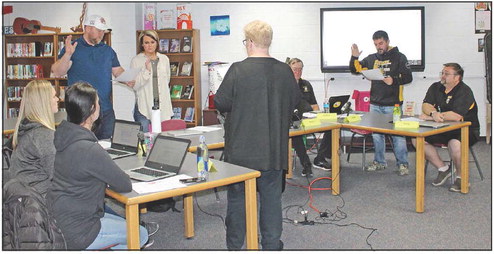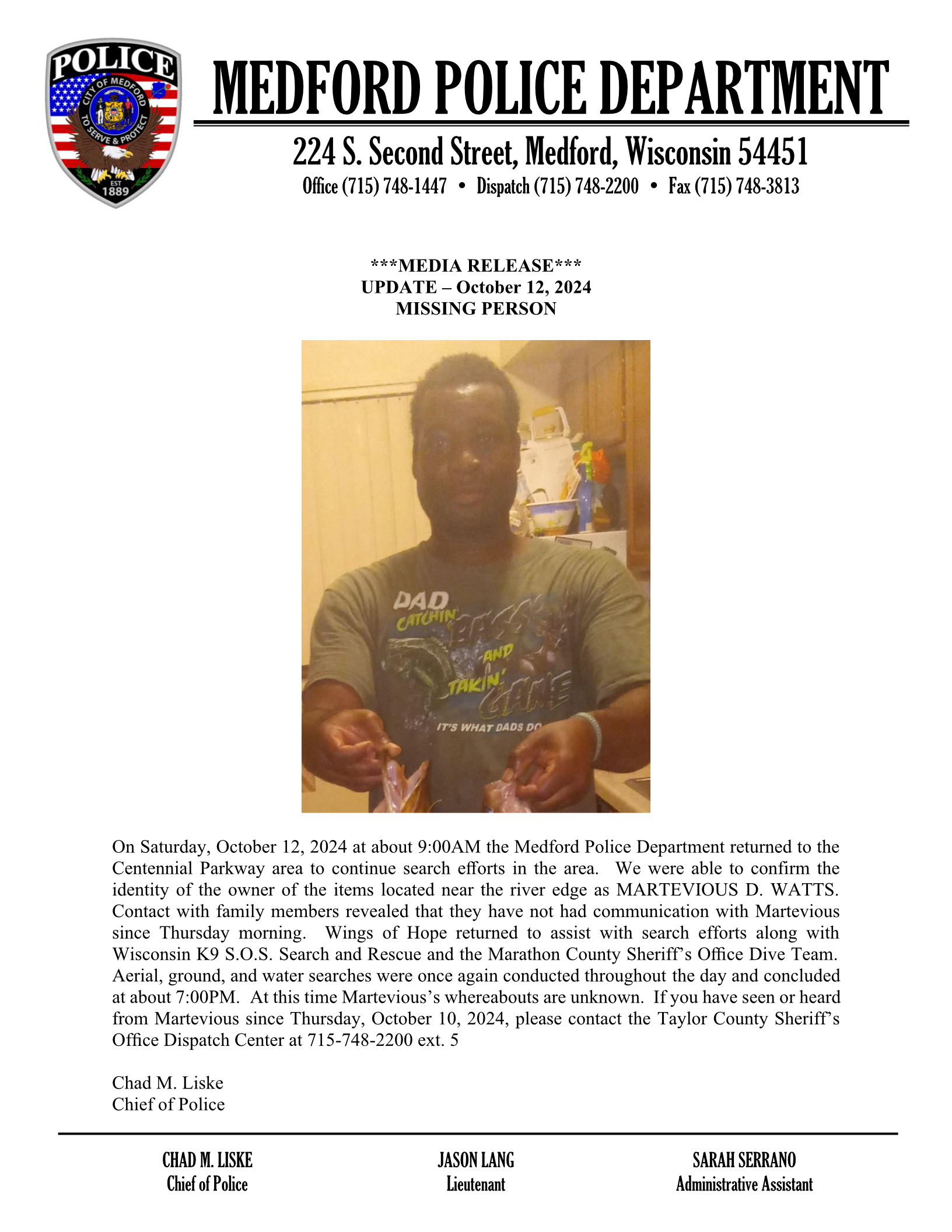Cadott School Board; Listening session planned for policies


Newly elected and re-elected members of the Cadott School Board took the Oath of Office April 25, during an organizational meeting. Sue Shakal, director of finance and human resources (front), administered the oath to board members, left to right, Kevin Roshell, Karen Winchell and Brad Sonnentag. Photo by Julia Wolf
By Julia Wolf
The Cadott School Board decided a public listening session should be one of the next steps in addressing updates to the district’s library policy, during a Committee of the Whole meeting April 25.
Prior to the committee meeting, the board’s yearly business was taken care of in an organizational meeting. During the meeting, new board members took the oath of office.
Members then held elections to determine board positions. Cory LaNou was voted in as board president; Becca Blanchette, vice president; Christine Rowe, clerk; and Kevin Roshell, treasurer.
Ced Boettcher was chosen as the Wisconsin Association of School Board (WASB) delegate and Blanchette as an alternate. LaNou was voted as the CESA 10 representative.
The discussion of library policy kicked off with superintendent Jenny Starck providing board members with a draft of the parent opt-out form, which would allow parents and guardians to designate that their child can only read in their reading level span, or not allow their child to check out certain materials by title.
Roshell asked if students would have access to the whole elementary library right away, if parents don’t fill out the opt-out form. Starck says they technically do, but there is some general readability oversight, where the child should be able to read the words. If the book is above the student’s reading level, Starck says the student will usually be redirected to something similar that the student can read the words.
Roshell asked if they would be better off with an opt-in form, where students are limited to their reading level, unless parents opt to give them wider access. Starck says the attorney recommended starting broader.
Starck also says the draft form is more specific than the previous one and would be more easily available, on the website and included in registration materials.
Board members thought a public listening session seems like the best step forward.
“I think there’s communication all over the place,” said LaNou. “And it’d be nice for everybody to have a place they feel they can come and state what they want to say, and give us some feedback.”
Blanchette says she thinks it would be helpful to present changes the board is thinking of implementing at the beginning of the listening session, so it is not a free-for-all, where the public can state whether they agree or disagree with the proposed changes, or add any they think the board should consider. Other board members thought that sounded like a good plan.
LaNou says, during the listening session, he thinks they need to be clear on what they currently do and what they will be capable of doing, so people know. Board member Karen Winchell said she would also like the protocol for what happens when a child brings up a book they are not allowed to check out.
Blanchette also suggested they look into removing the Reconsideration Committee from material appeals and bring it straight to the board, since the committee added a lot of time to the process.
Other changes for the board to consider that were suggested, was shortening the reconsideration block on a book from three years to one year, and limiting the number of books that can be put forward for reconsideration at a time, for timeliness sake.
LaNou says he also thinks they should review the steps listed for the reconsideration process, as well as the timeline, so deadlines and expectations are clearer.
Board member Brad Sonnentag says he would like to hear public opinion on how the library is set up. LaNou says he would love to see a separate middle school library, since children’s maturity levels changes so much in that timeframe.
LaNou says he has also gotten feedback from people who would like to see a list of incoming books before they arrive at the library, so they can review the list.
“Right now, when new books come, they are there,” said Starck, adding they could share the list in advance, potentially even two or three months before they arrive.
Roshell says he would like to see any books removed be replaced with another on the same subject, so there is still a wide variety of materials.
Blanchette says she would also like to see a tutorial on how to search the library offerings, during the listening ses- sion.
“Before all this started, I had never gone on our library website,” said Blanchette.
“Even a parent can search for subjects they’re concerned about,” said Starck, who agreed she could add that to the information for the beginning of the session.
Board members agreed to set the public listening session for Monday, June 27. More details will be available closer to the event time.
For the LMC position, board members discussed if additional tech support through Krista Computers would impact the current and potential additional LMC directors.
Starck says they believe the additional LMC director is an important position, but says it can also wait if the board wants library policies updated before a decision is made.
Starck says they have not scheduled the electives the LMC candidate would teach, such as STEM classes, in case they do not find a strong candidate for the position. She says it would be tight to add those to the schedule for the upcoming year.
“We have kids signing up for secondary schedules right now,” said Starck.
Sonnentag asked when the best time to fill a position like this would be and Starck said the earlier the better, around March and April. Sonnentag said a hire for the upcoming year, would give the new LMC director time to train for the position, before teaching, which Starck says they can bring to the May meeting for action.
Starck also gave an update on library damage that was discovered earlier in the month. She says the adminstration worked with law enforcement and the investigation is now closed. Starck says it was things that happened over time.
“The biggest reaction we have is, going forward, how we are going to prevent this from happening,” said Starck.
She says they now have a security camera installed, as well as a different protocol for library use.
“We’re confident we’ve addressed that issue,” said Starck. Members also discussed pre-employment and random drug screenings for district employees, especially for staff members driving school vans. Starck says she is waiting to hear back from Marshfield Clinic on costs and reached out to legal counsel for their recommendations on the matter.
“Pre-employment testing is, we’ll just say, the most defensible,” said Starck. “It’s not necessarily common in school districts.”
Starck says the random testing is a little bit trickier and reminded board members they had previously talked about only doing that for those driving students.
“If this is something that we want to consider, we would have attorneys draft specific policy and process around it,” said Starck.
Starck says legal counsel also says that search is different for governments, which the district falls under, than private entities.
“What I would personally like to see is drug testing, minimally, for anybody that is going to drive the kids around,” said LaNou. “I know the buses do their own drug testing.”
LaNou says searches he did on his own shows the Green Bay Area Public School District does drug testing. He says he would like some clarification on how that works for them. Starck offered to connect with them.
Sonnentag said he would like to see the policies for districts that do drug testing and what their legal counsel says about it. Starck said she would reach out to some districts.
Starck says she can also check with WASB if they updated their recommendations on the matter.
“Can you find out, too, what we are required to do with that information, if a positive test comes back?” asked Blanchette.
Starck agreed she could also look into that.



